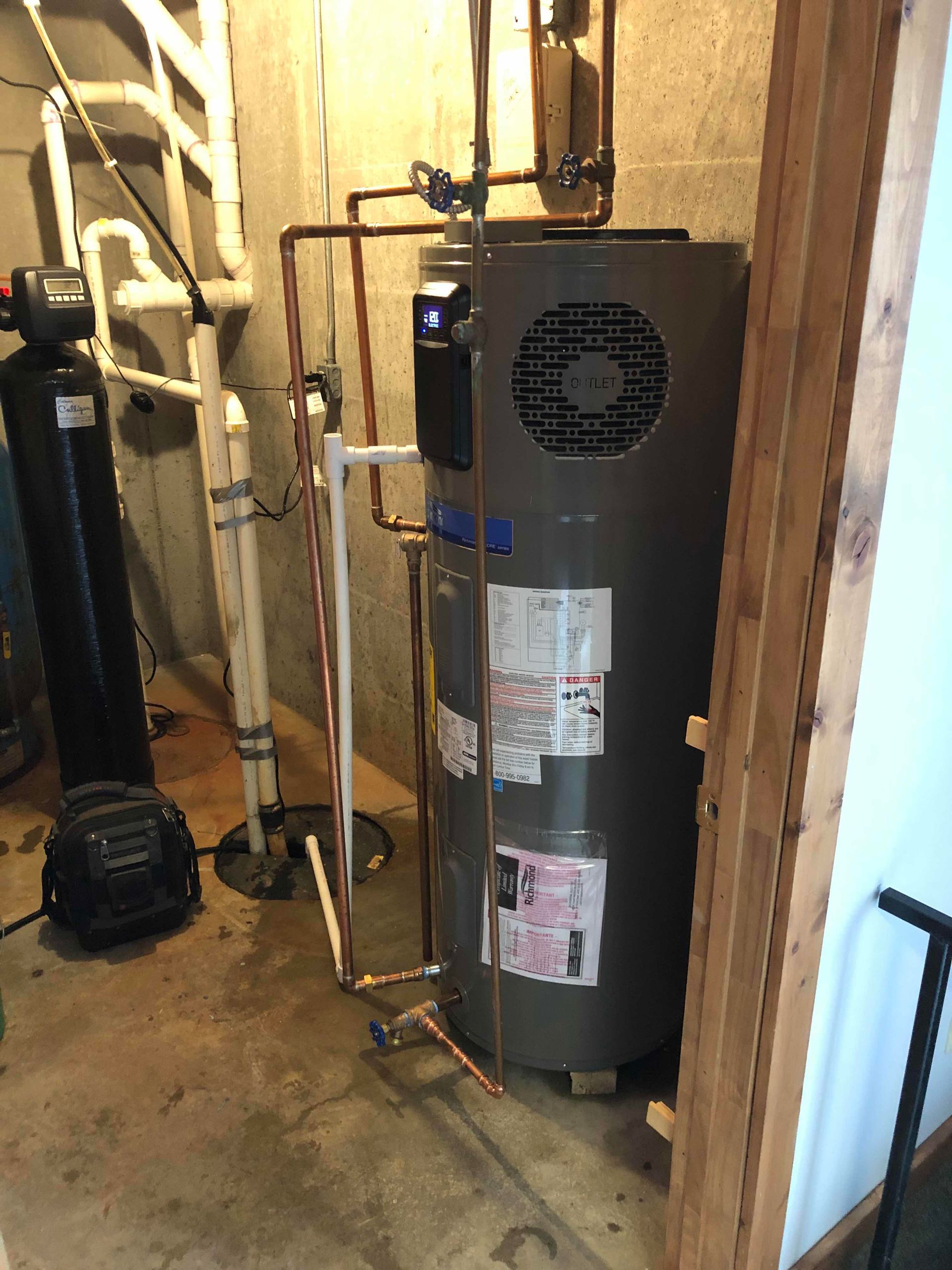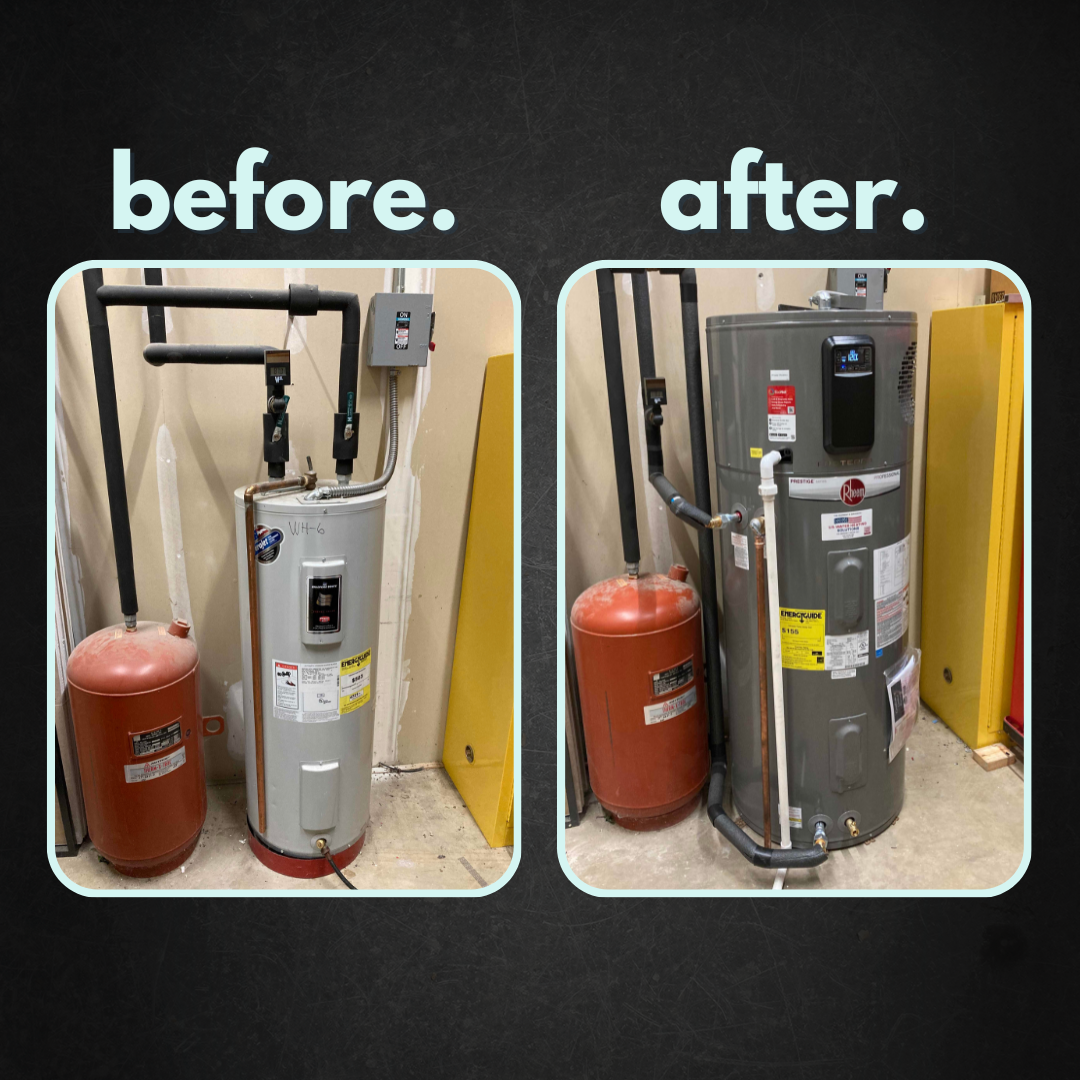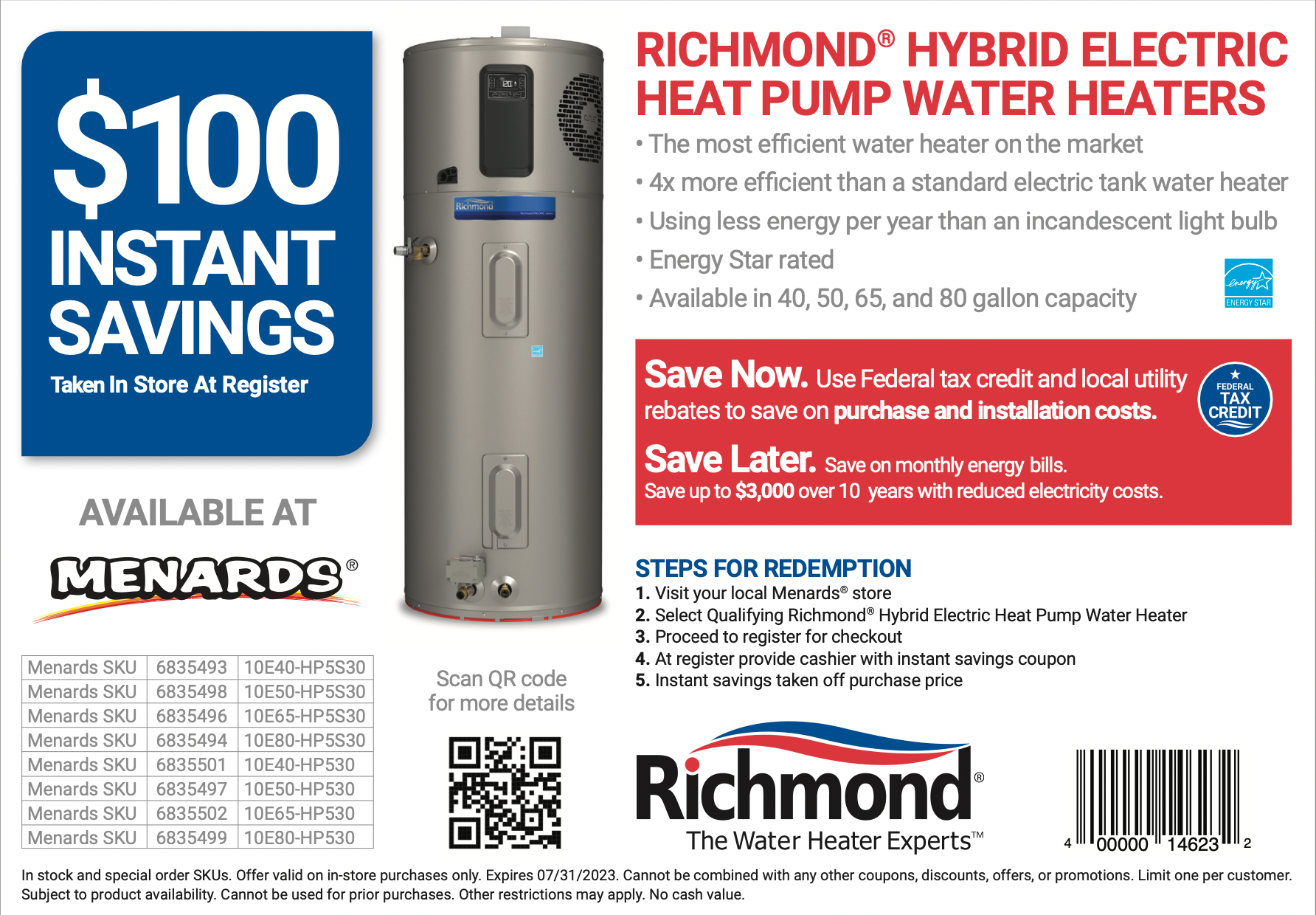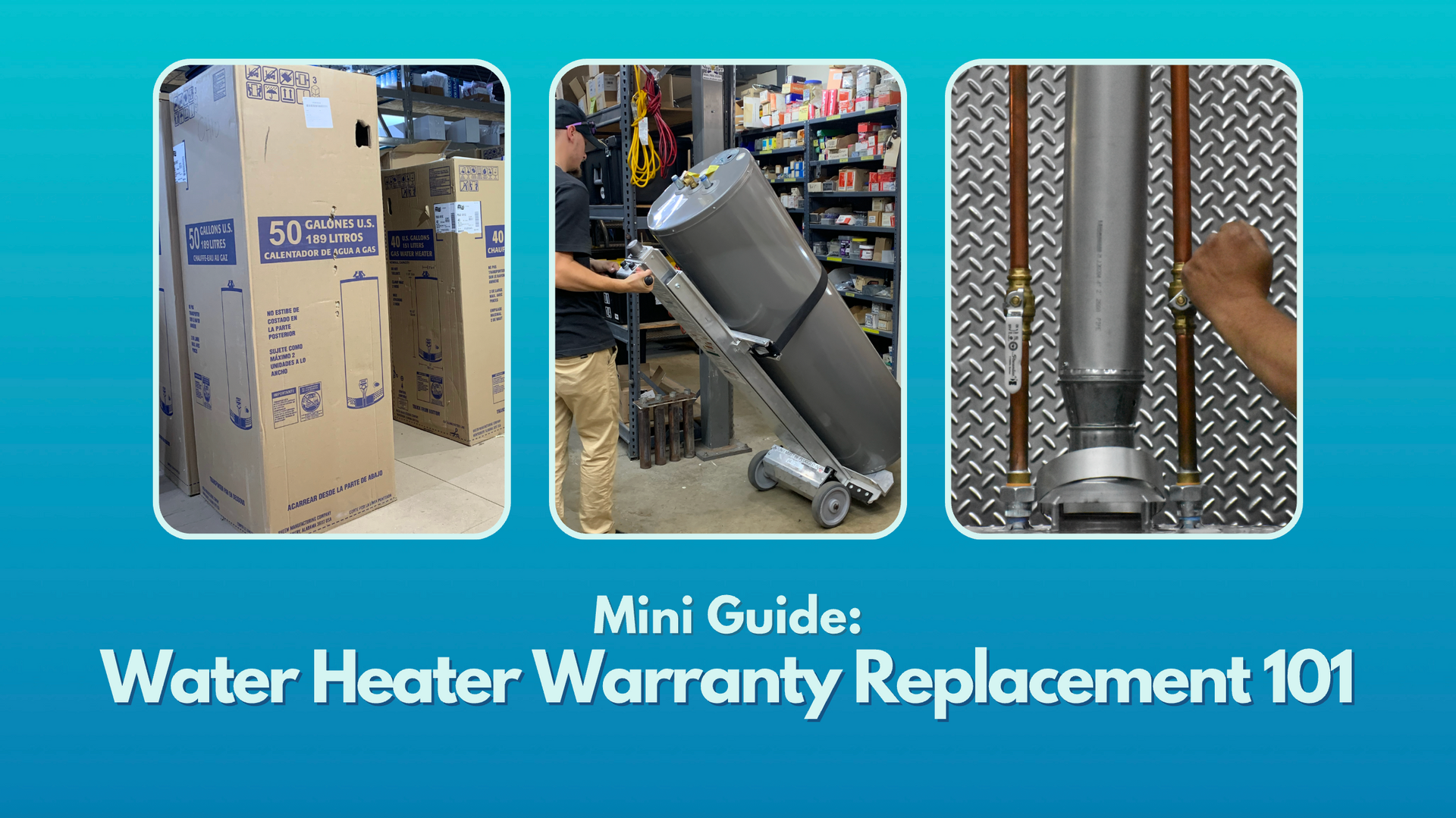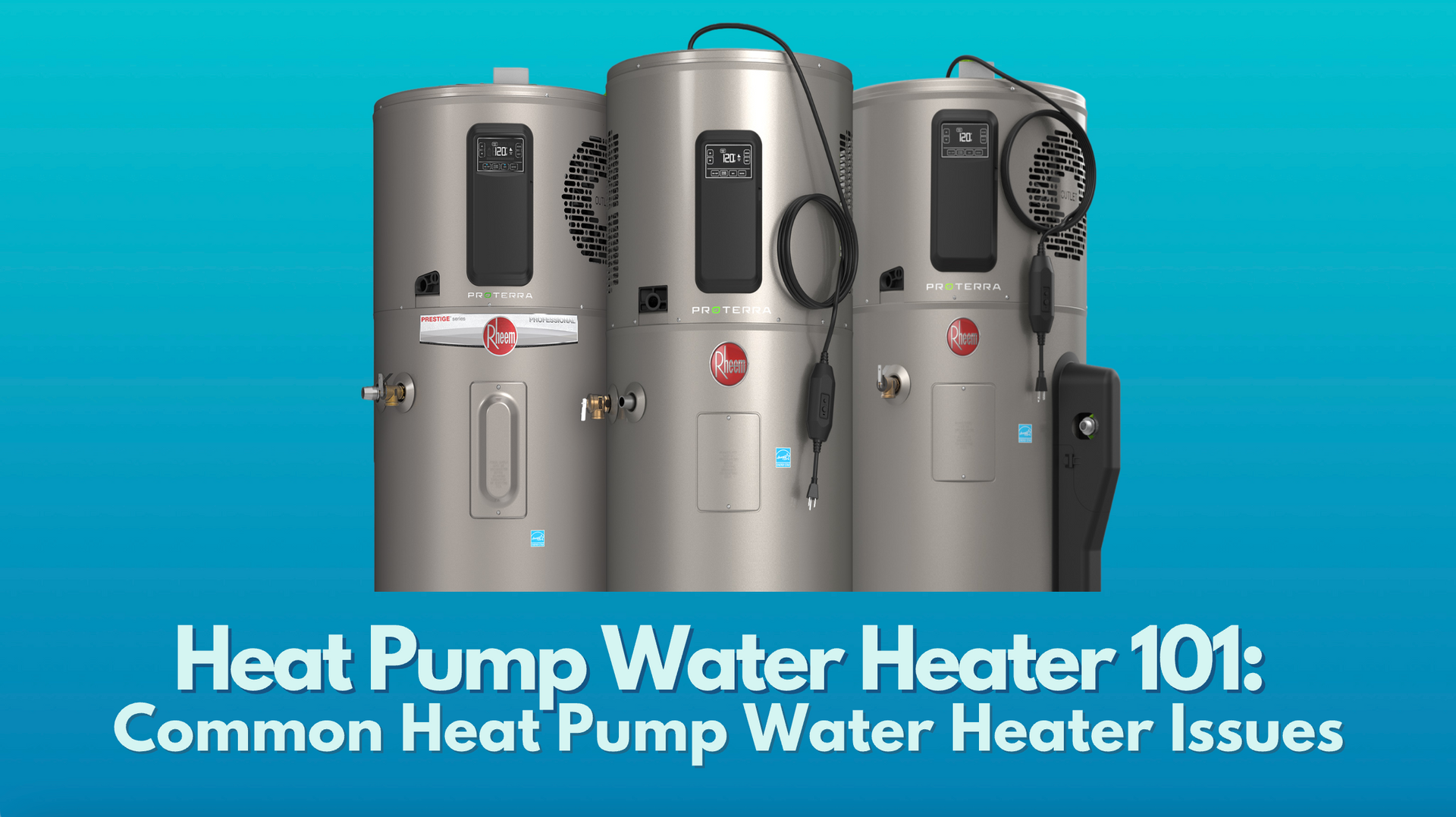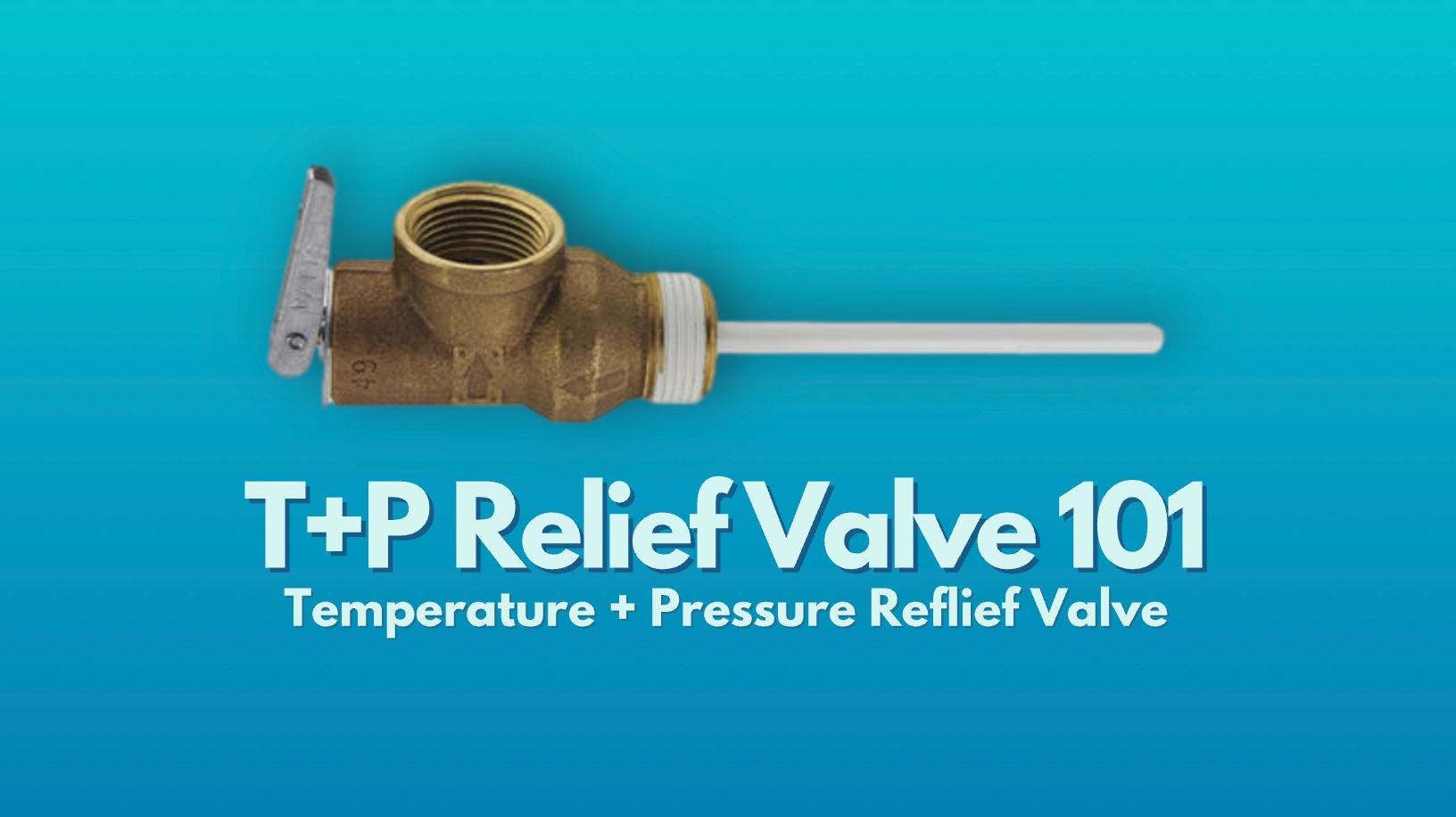Heat Pump Water Heaters (HPWHs) 101: An Overview
Everything to Know About Heat Pump Water Heaters
Most homeowners assume that they need to pick between a gas water heater or an electric water heater. However, there are a growing number of alternative fuel source choices reaching the market, including heat pump water heaters (HPWHs) and solar water heaters.
So,
what exactly is a heat pump water heater? If you don’t know, you’re not alone. We will explain how a heat pump water heater works, how it compares to other options, and who would benefit the most from buying one.
Heat Pump Water Heaters: Hybrid Hot Water Heaters
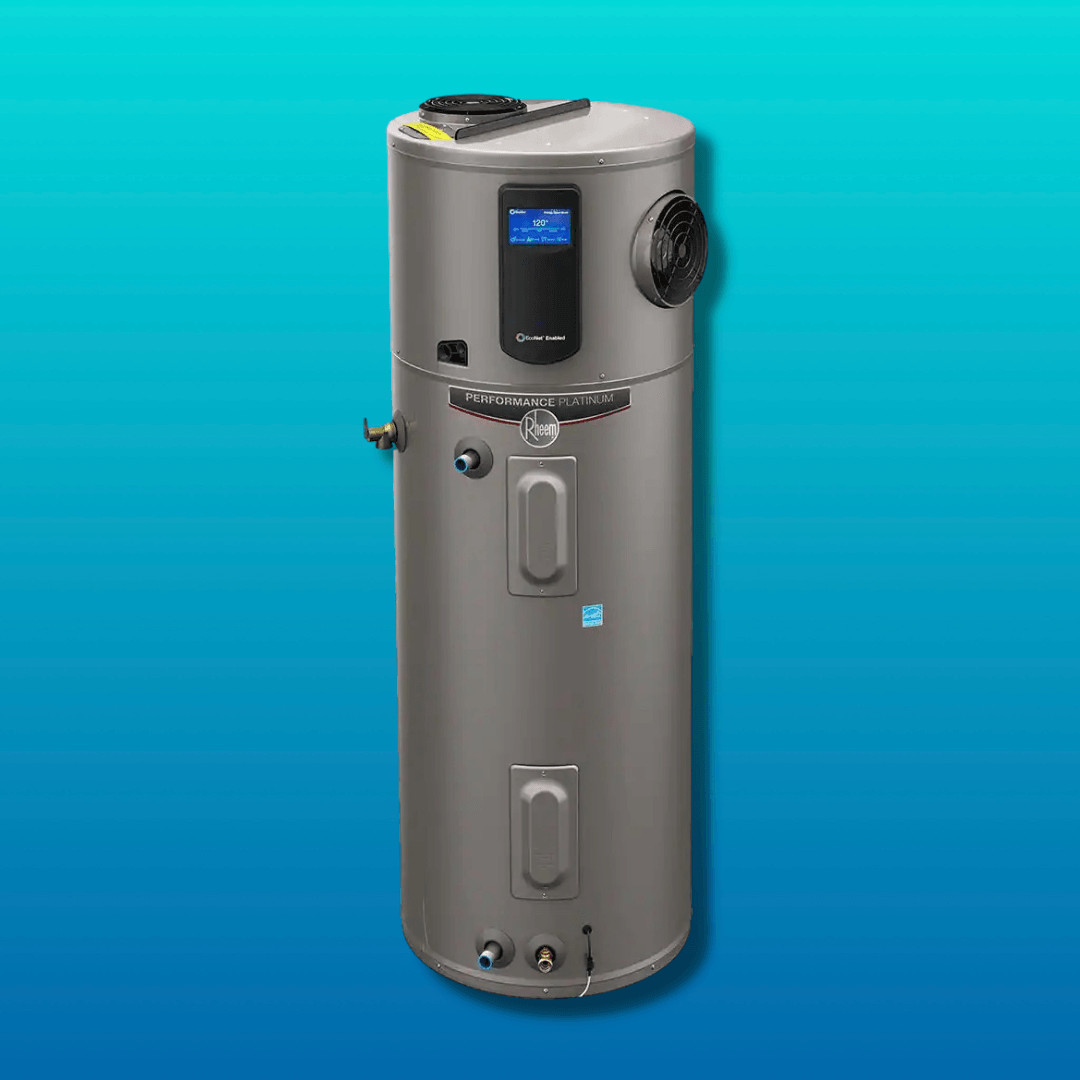
Heat pump technology combines the power of HVAC with pre-existing water heater technology, thus giving way to these "hybrid" models. When searching for information about heat pump water heaters you may also see the following product names/descriptions:
- Hybrid Electric Water Heater
- Hybrid Heat Pump Water Heater
- Hybrid Electric Heat Pump Water Heater
- Heat Pump Hybrid Water Heater
Heat pump water heaters are essentially a combination of a tank type electric water heater, a fan, an evaporator, and a compressor. You can think of these hybrid heat pump water heaters like hybrid cars: they have two controllable energy source that work to supplement one another. The main source of energy is hybrid, while the supplementary source of energy is electricity; the alternative energy source for hybrid water heaters is only ever electricity -- never natural gas or propane. It is also important to note that many manufacturers separate heat pump units (electric) from high efficiency units (gas) to distinguish this difference between energy types.
Hybrid water heaters contain multiple settings for users to switch between multiple heating methods. One setting will have the unit work exclusively as a heat pump and one will have the unit work exclusively as an electric water heater. In some cases, there will be a setting that allows the unit to automatically switch when detected by the unit.
How Heat Pump Water Heaters Work
As we mentioned, heat pump water heaters are essentially electric tank type water heaters with an HVAC system (fan, compressor, and evaporator) affixed to the top. Here's how they work:
- Heat pump water heaters use their fans to move heat from the existing air (room air) into the evaporator coil, which contains refrigerant.
- The combination of the room air, humidity, and refrigerant in the evaporator coil turns the refrigerant into vapor.
- Next, the vapor is sent through a compressor which is connected to a series of coils around the inside of the tank, which transfers heat to the water inside the tank.
- Lastly, the vapor turns back into a liquid, returns into the compressor, and the process repeats.
Thus, rather than focusing solely on creating new heat using electricity or gas, the hybrid heat pump models first harness the heat in the surrounding air. In order to ensure households can still use heat pumps in cold weather, many systems include the option to use electricity to heat the water using
heating elements. |
Source:
A.O. Smith

Diagram Credit: U.S. Department of Energy
Inside a Heat Pump Water Heater
In summary, a heat pump works like a refrigerator in reverse. It absorbs heat from the air around it and uses it to heat water inside of a storage tank. There are, however, other types of equipment known as "heat pumps."
Heat Pump Water Heaters vs. Other Heat Pumps
(Water Heating vs. HVAC)
Earlier in the article, we clarified that we are specifically referring to heat pump water heaters, not to be confused with other HVAC heat pumps such as: air-source heat pumps nor geothermal heat pumps.
- Air-source heat pumps = part of your HVAC system that seeks to heat/cool your home's air temperature by using the heat inside the air (Source: U.S. Department of Energy)
- Geothermal heat pump = a type of HVAC system that uses heat from the ground or a near by water source to heat (Source: U.S. Department of Energy)
In most situations, these heat pumps serve as temperature control for a home. Air-source heat pumps exclusively rely on transferring the heat energy from the air and usually heat or cool an entire home as opposed to the water. To contribute to the home’s cooling system, the unit can disperse the remaining cool air into the home. Alternatively, the system can transport air outside.
Most heat pumps are geothermal heat pumps. They take heat from the air in the summer and the ground from the winter. In some cases, geothermal heat pumps can be coupled with a traditional tank type water heater via the addition of a desuperheater add-on, enabling the unit's excess energy to support a water heater (Source: U.S. Department of Energy).
Please note: U.S. Water Heating Solutions does
NOT install nor service geothermal heat pump HVAC systems at this time, but we
DO
install heat and service heat pump water heaters.
Is There a Tankless Heat Pump Water Heater?
At present, there is only one known tankless water heater model which uses heat pump technology: the Intellihot iE1 Electron Series. There is currently only a commercial model available, meaning it is best suited for: restaurants, multi-family dwellings, or larger single-family homes.
The iE1's design differs slightly from the general residential heat pump water heater overview provided above, as this unit's goal is to generate on-demand hot water (i.e., transferring the heat from the air into the water via the heat exchanger as the demand for water arises); this differs from the tank type heat pump shown above, which stores heated water.
The present lack of a smaller tankless heat pump water heater for single-family residential settings is likely due to the space confinements posed by tankless, which will require some additional engineering to be downsized.
Pros and Cons of Heat Pump Water Heaters
Heat pump water heaters (HPWHs) have unique pros and cons that set them apart from other water heaters. Learn more about the advantages and disadvantages of heat pump water heaters to determine if they are the right option for you and your family.
Advantages of Heat Pump Water Heaters
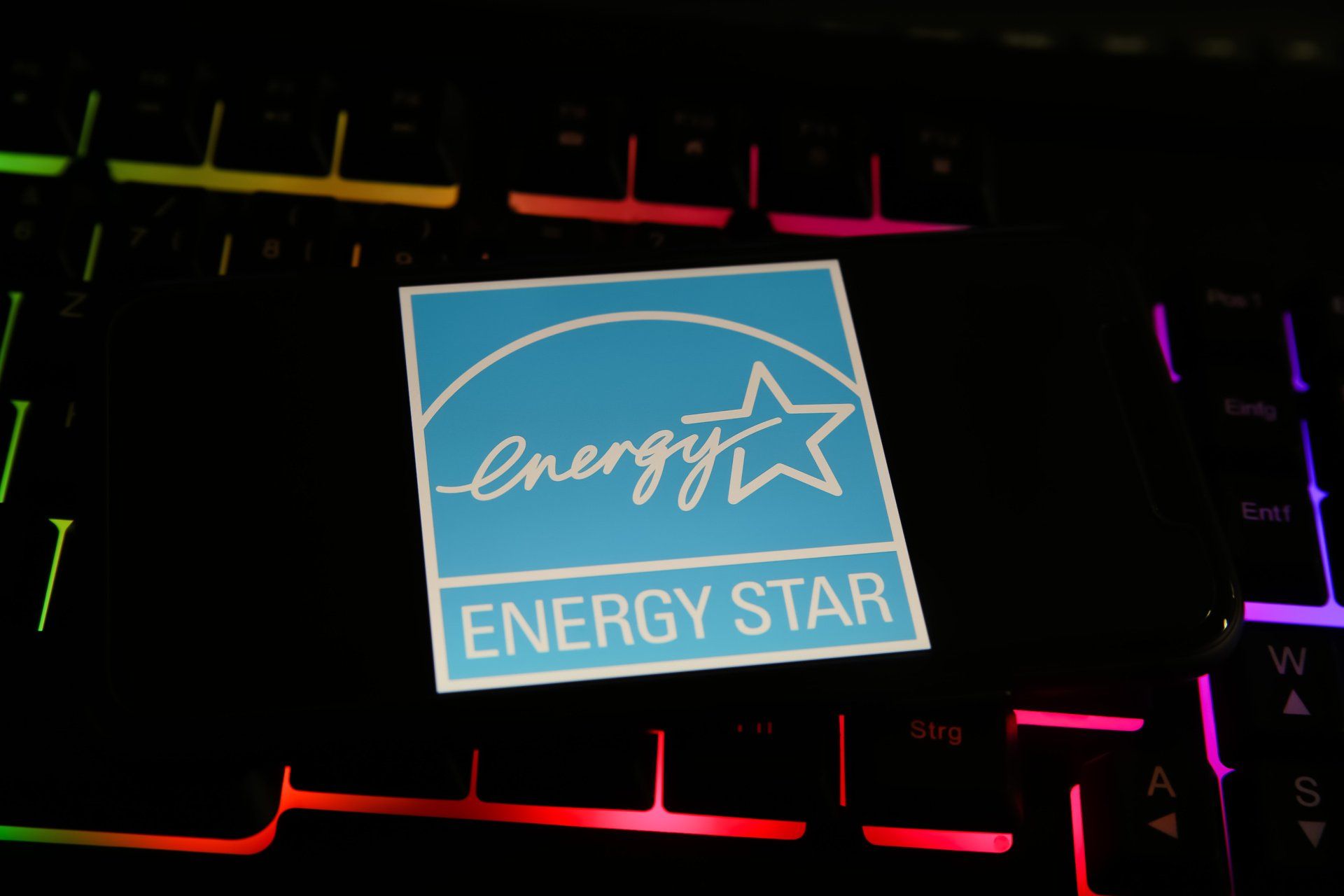
#1. Greater Efficiency
Since heat pumps use the excess heat around them to heat water instead of creating their own energy, they use a high efficiency method to heat water. Almost all HPWHs have a very high
Uniform Energy Factor (UEF) and an
Energy Star
sticker on them, indicating that they meet or (in most cases) exceed Energy Star regulations.
Heat pumps use an average of 60-70% less energy than traditional electric water heaters to operate, and are estimated to cost ~41% less to operate per year ($240 average versus $580). These savings are in addition to the ample federal income tax rebates and utility company rebates currently available to many home and business owners who switch to heat pump water heaters.
#2. Eco-Friendly
Since heat pumps create their own energy, they don’t emit many greenhouse gas emissions (GHG emissions), making them a clean energy source.
Heat pumps are becoming a fast consumer favorite due to their low energy use and benefits for the environment.
#3. Quiet
Heat pumps tend to create
less noise than most other water heating options, which can be helpful if the water heater is in a spot near your bedroom or other important room in your home. A.O. Smith hybrid heat pumps typically operate
around 51 decibels, while Rheem heat pumps have previously been rated for 49 decibels,
both of which have been disputed by some heat pump users.
#4. Longer Limited Warranty
In order to further incentivize customers to switch to heat pump water heaters, many major manufacturers are also offering a longer limited warranty. The "standard" length of a limited warranty (the warranty that covers replacement parts and the tank itself, not necessarily labor), is almost always 3, 6, 9, or 12 years for a traditional tank type electric water heater; the average consumer purchases a 3, 6, or 9 year limited parts and tank warranty, which corresponds to an increase in cost. In contrast, here are some example heat pump water heater warranty summaries:
- A.O. Smith: 10-year tank warranty, 10-year parts warranty, 1-year in-home labor warranty
- Rheem: 10-year tank warranty, 10-year parts warranty, 1-year in-home labor warranty
- Richmond: 10-year tank warranty, 10-year parts warranty, 2-year in-home labor warranty
- Ruud: 10-year tank warranty, 10-year parts warranty, 1-year in-home labor warranty
NOTE: ALWAYS check the manufacturer's website and/or call their customer service regarding warranty specifications for your specific model
Disadvantages of Heat Pump Water Heaters
#1. Greater Initial Investment
Heat pumps cost significantly more than other water heater units (roughly
$1200 - $2500
depending on the size and brand of the tank).
They also usually cost an additional $600-$1,000 more to install than traditional tank type water heaters. This difference is often due to their larger height from the add-on compressor and customers often needing to upgrade their electrical panel when switching from a gas water heater.
Although there are federal income tax benefits, utility company benefits, and even the occasional instant rebate, a federal income tax credit will not be immediately processed.

#2. Strict Installation Requirements
Heat pumps have strict installation requirements due to their reliance on heat from the air around them: they need sufficient air flow to operate as an air-source water heater. Most heat pump models require
at least 700 cubic feet of air space around them, and they must reside in a room that is constantly between
40°F - 90°F.
#3. Not as Efficient in Cold Weather
Since heat pumps must exist in a space that remains between
40°F - 90°F, they don’t make the best option for people who live in cold climates.
When heat pumps work in cold weather, it can take an extremely long time to heat up the water in the tank. The system also won’t operate as efficiently, as it relies on the
elements in the tank for supplementary water heating. Thus, when the elements kick in, the household is less likely see the savings they expect to receive from the famously efficient water heater.
To increase heat pump efficiency, many homeowners place the heat pump in a furnace room or other room in the house that has a reliable temperature.
#4. Not Every Service Provider May Service Heat Pump Water Heaters Nor Stock Parts
Although heat pump technology has been making its way into the water heater industry for the last decade, not every water heater repair service nor plumber in your area may have experience with heat pumps because these units are only just beginning to see a rise in popularity. Additionally, many service providers and plumbers may not stock parts for these units due to the ongoing supply chain and sourcing issues. In November 2022 the U.S. Department of Energy even announced an investment plan to fund the "[... acceleration of] domestic electric heat pump manufacturing," including water heaters.
Pro tip: ASK your service provider if the local technician has experience with heat pump water heaters and whether they have parts in stock or would have to order them.
Who Should Get a Heat Pump Water Heater?
Still not sure if heat pump water heaters are the right solution for you? Learn what customers benefit the most from heat pumps.
People who live in warm climates, including most of the Southern states in the United States, can most likely provide the unit with its two main requirements: plenty of heat and the
air space required to perform effectively and efficiently. We have seen a rising demand for heat pump water heaters in the midwest, as clients opt to take advantage of the energy efficiency and savings during the spring and summer.
Homeowners who
prioritize eco-friendly heating methods over quick heating should also consider using heat pumps, as they are one of the most eco-friendly options available.
Homeowners with a larger budget to put toward their initial water heater investment investment should also consider switching to a heat pump; if you have a smaller budget, we recommend throughly researching the
tax benefits, rebates, and instant coupons in advance
and
to consider purchasing/installing your unit through a company that offers financing options, like U.S. Water Heating Solutions!
U.S. Water Heating Solutions
Here at U.S. Water Heating Solutions, we have experience with all types of water heaters, produced by the major manufacturers, including heat pump water heaters.
We can upgrade your
current set-up to a heat pump system, help you
maintain your heat pump water heater, and provide water heater repair when something goes wrong.
Contact U.S. Water Heating Solutions
to get a quote today!




